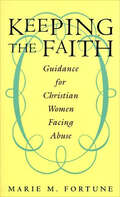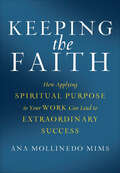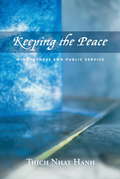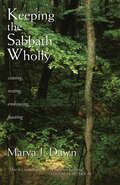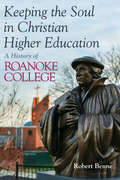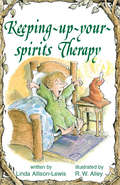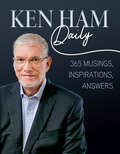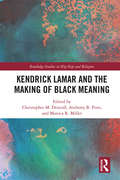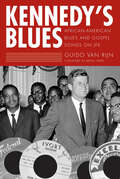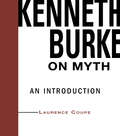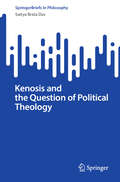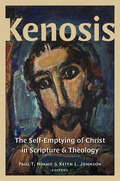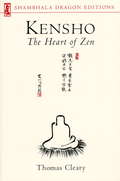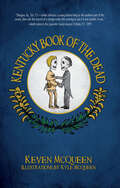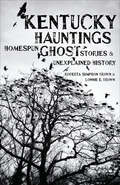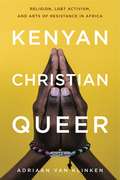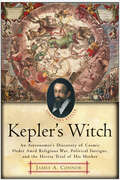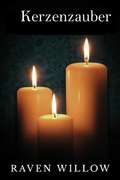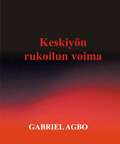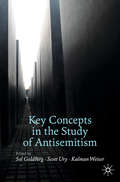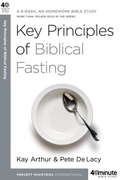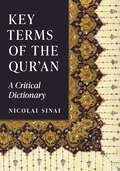- Table View
- List View
Keeping the Faith: Guidance for Christian Women Facing Abus
by Marie M. FortunePractical guide addresses issues of faith for battered women—an invaluable resource for victims of domestic violence and the crisis centers that counsel them.
Keeping the Faith: How Applying Spiritual Purpose to Your Work Can Lead to Extraordinary Success
by Ana Mollinedo MimsMore than an average author of a how-to-succeed book, Ana Mollinedo Mims is on a mission. A devout Christian herself, Ana has blended what has brought her to the top of her game, as an executive at a Fortune 500 company, with the faith–based philosophy she believes is the foundation for her finding meaning, and thus success, in all aspects of her professional life.The principles Ana discusses in this book–faith, integrity, humility, prayer, forgiveness, stewardship, and legacy–are concepts which have carried her well into a very distinguished career. They are principles that underlie a spirit–led career she believes is possible for anyone wanting to give purpose to the single most time–consuming aspect of all our lives: work.Keeping The Faith looks at some of the common struggles all people face at various stages of their working lives–helping readers to remain true to what they deeply believe. From her own experiences, Ana shows us that when difficulties and doubts are confronted using her unique take on spiritual pragmatism, each difficulty can extend itself into success, growth, and a clearer understanding of one's self, and one's own sense of professional purpose.Ana believes that the answers or the outcomes in each case will become clearer, more deeply satisfying, more "right," when one is able to shift one's line of sight, and consider what it means to blend a working life together with devoutly spiritual one.
Keeping the Peace: Mindfulness and Public Service
by Thich Nhat HanhKeeping the Peacespeaks to all of us who work in difficult, people-oriented jobs and shows us how to turn environments that are often filled with anger, stress, and frustration into islands of peace. Zen Master Thich Nhat Hanh creates a revolutionary definition of public service that includes all of us. He challenges us to transform the way we think about our work and offers eleven key practices to strengthen our mindfulness and joy.Based on a retreat for civil servants, Keeping the Peace is the first book of its kind to demonstrate the usefulness of mindfulness practices for law enforcement officers, social workers, teachers, and others in people-helping professions. With empathy and humor, Thich Nhat Hanh demonstrates the need for public service professionals to cultivate their own inner peace in order to help others. In clear and simple prose, he offers a path for how we can reduce violence in ourselves, our workplace, and ultimately, in our world.
Keeping the Sabbath Wholly: Ceasing, Resting, Embracing, Feasting
by Marva J. Dawn“But I don’t wanna go to church!” Marva Dawn has often heard that cry—and not only from children. “What a sad commentary it is on North American spirituality,” she writes, “that the delight of ‘keeping the Sabbath day’ has degenerated into the routine and drudgery—even the downright oppressiveness—of ‘going to church.’” According to Dawn, the phrase “going to church” both reveals and promotes bad theology: it suggests that the church is a static place when in fact the church is the people of God. The regular gathering together of God’s people for worship is important—it enables them to be church in the world—but the act of worship is only a small part of observing the Sabbath. This refreshing book invites the reader to experience the wholeness and joy that come from observing God’s order for life—a rhythm of working six days and setting apart one day for rest, worship, festivity, and relationships. Dawn develops a four-part pattern for keeping the Sabbath: (1)ceasing—not only from work but also from productivity, anxiety, worry, possessiveness, and so on; (2) resting— of the body as well as the mind, emotions, and spirit—a wholistic rest; (3) embracing—deliberately taking hold of Christian values, of our calling in life, of the wholeness God offers us; (4) feasting—celebrating God and his goodness in individual and corporate worship as well as feasting with beauty, music, food, affection, and social interaction. Combining sound biblical theology and research into Jewish traditions with many practical suggestions, Keeping the Sabbath Wholly offers a healthy balance between head and heart: the book shows how theological insights can undergird daily life and practice, and it gives the reader both motivation and methods for enjoying a special holy day. Dawn’s work— unpretentiously eloquent, refreshingly personal in tone, and rich with inspiring example—promotes the discipline of Sabbath-keeping not as a legalistic duty but as the way to freedom, delight, and joy. Christians and Jews, pastors and laypeople, individuals and small groups—all will benefit greatly from reading and discussing the book and putting its ideas into practice.
Keeping the Soul in Christian Higher Education: A History of Roanoke College
by Robert D. BenneMany colleges with historical church ties experience significant tension between the desire to compete in the secularized world of higher education and the desire to remain connected to their religious commitments and communities. In this history of one such school, Roanoke College, Robert Benne not only explores the school's 175-year tradition of educational excellence but also lays bare its complicated and ongoing relationship with its religious heritage. Benne examines the vision of ten of Roanoke's presidents and how those visions played out in college life. As he tells the college's story, Benne points to specific strengths and weaknesses of Roanoke's strategies for keeping the soul in higher education and elaborates what other Christian colleges can learn from Roanoke's long quest.
Keeping the Soul in Christian Higher Education: A History of Roanoke College
by Robert D. BenneMany colleges with historical church ties experience significant tension between the desire to compete in the secularized world of higher education and the desire to remain connected to their religious commitments and communities. In this history of one such school, Roanoke College, Robert Benne not only explores the school's 175-year tradition of educational excellence but also lays bare its complicated and ongoing relationship with its religious heritage. Benne examines the vision of ten of Roanoke's presidents and how those visions played out in college life. As he tells the college's story, Benne points to specific strengths and weaknesses of Roanoke's strategies for keeping the soul in higher education and elaborates what other Christian colleges can learn from Roanoke's long quest.
Keeping-up-your-spirits Therapy
by R. W. Alley Linda Allison-LewisHas illness, loss, or emotional pain worn you down? If so, this affordable and uplifting attitude-adjuster is just the book to bolster your spirits and help you smile in the face of life's inevitable rough spots.
Ken Ham Daily: 365 Musings, Inspirations, Answers
by Ken HamA Powerful Resource to Equip You with Biblical Truths for Everyday Life Ken Ham Daily: 365 Musings, Inspirations, Answers is an essential resource for Christian parents looking to strengthen their family’s faith and equip their children to stand firm in today’s culture. This collection of 365 daily readings by renowned apologist Ken Ham offers a unique opportunity to guide your family through biblical truths that address the most pressing spiritual and cultural issues of our time. Perfect for family devotions, Ken Ham Daily encourages parents to take the lead in discipling their children. With each reading, you can easily guide your family through topics like the nature of God, salvation, the authority of Scripture, and the importance of the church. These reflections are also a powerful resource for your church community, offering daily lessons that can be shared in small groups, Bible studies, and Sunday school classes. Ken Ham’s fifty years of ministry experience have culminated in this incredible resource, designed to help Christian families like yours live out their faith with confidence. Ken Ham Daily isn’t just a book—it’s a tool for cultivating a strong, lasting biblical foundation in your home and church. Let this resource help you lead your family in faith, one day at a time.
Kendrick Lamar and the Making of Black Meaning (Routledge Studies in Hip Hop and Religion)
by Anthony B. Pinn Monica R. Miller Christopher M. DriscollKendrick Lamar has established himself at the forefront of contemporary hip-hop culture. Artistically adventurous and socially conscious, he has been unapologetic in using his art form, rap music, to address issues affecting black lives while also exploring subjects fundamental to the human experience, such as religious belief. This book is the first to provide an interdisciplinary academic analysis of the impact of Lamar’s corpus. In doing so, it highlights how Lamar’s music reflects current tensions that are keenly felt when dealing with the subjects of race, religion and politics. Starting with Section 80 and ending with DAMN., this book deals with each of Lamar’s four major projects in turn. A panel of academics, journalists and hip-hop practitioners show how religion, in particular black spiritualties, take a front-and-center role in his work. They also observe that his astute and biting thoughts on race and culture may come from an African American perspective, but many find something familiar in Lamar’s lyrical testimony across great chasms of social and geographical difference. This sophisticated exploration of one of popular culture’s emerging icons reveals a complex and multi faceted engagement with religion, faith, race, art and culture. As such, it will be vital reading for anyone working in religious, African American and hip-hop studies, as well as scholars of music, media and popular culture.
Kennedy's Blues: African-American Blues and Gospel Songs on JFK (American Made Music Series)
by Guido van RijnKennedy's Blues: African American Blues and Gospel Songs on JFK collects in a single volume the blues and gospel songs written by African Americans about the presidency of John F. Kennedy and offers a close analysis of Kennedy's hold upon the African-American imagination. These blues and gospel songs have never been transcribed and analyzed in a systematic way, so this volume provides a hitherto untapped source on the perception of one of the most intriguing American presidents. After eight years of Republican rule, the young Democratic president received a warm welcome from African Americans. However, with the Cold War military draft and the slow pace of civil rights measures, inspiration temporarily gave way to impatience. Dr. Martin Luther King, Jr., Medgar Evers, the March on Washington, and the groundbreaking civil rights bill all found their way into blues and gospel songs. The many blues numbers devoted to the assassination and the president's legacy are evidence of JFK's near-canonization by African Americans. Blues historian Guido van Rijn shows that John F. Kennedy became a mythical hero to blues songwriters despite what was left unaccomplished.
Kenneth Burke on Myth: An Introduction (Theorists of Myth)
by Lawrence CoupeKenneth Burke--rhetorician, philosopher, linguist, sociologist, literary and music critic, crank--was one of the foremost theorists of literary form. He did not fit tidily into any philosophical school, nor was he reducible to any simple set of principles or ideas. He published widely, and is probably best known for two of his classic works, A Rhetoric of Motive and Philosophy of Literary Form. His observations on myth, however, were never systematic, and much of his writing on literary theory and other topics cannot be fully understood without fleshing out his thoughts on myth and mythmaking.
Kenosis and the Question of Political Theology (SpringerBriefs in Philosophy)
by Saitya Brata DasThe book based on the concept of kenosis explores the thought of a political theology as deconstruction of sovereignty. It takes up the most difficult question of God’s revelation as the very revelation of love. It connects the theological inquiry to ecology, emphasizing humanity's redemption as intertwined with nature's salvation. It also critiques modern metaphysical views that treat nature as mere resource, urging a recognition of our essential interconnectedness with all beings. By taking Paul’s conception of kenosis seriously, this book aims to dismantle existing sovereign powers and challenge the notion of human supremacy in global politics. It seeks to reintegrate transcendence into contemporary debates on post-secularism and religion, while addressing the urgent ecological crises we face. An interesting read for upper-level undergraduates, graduate students, scholars, and other intellectuals interested in philosophy of religion and philosophical theology.
Kenosis: The Self-Emptying of Christ in Scripture and Theology
by Edited by Paul T. Nimmo and Keith L. JohnsonSeventeen distinguished scholars from the fields of biblical studies, historical theology, and systematic theology engage with the past and present significance of the doctrine of kenosis—Paul&’s extraordinary claim in Philippians 2 that Jesus Christ emptied and humbled himself in obedience on his way to death upon the cross. In the &“Christ-hymn&” of Philippians 2, the apostle Paul makes a startling claim: that Jesus &“emptied himself&” in order to fulfill God&’s will by dying on the cross. The self-emptying of Christ—theologically explored in the doctrine of kenosis—is a locus within Christology and factors significantly into understandings of the Trinity, anthropology, creation, providence, the church, and even ethics. As such, it has been debated and reflected upon for centuries. The present volume draws together some of the finest contemporary scholars from across the ecumenical spectrum to expound the doctrine of kenosis—its biblical roots, its historical elaborations, and its contemporary implications. With original essays from John Barclay, Beverly Roberts Gaventa, David Fergusson, Katherine Sonderegger, Thomas Joseph White, and more, this indispensable resource offers an extensive overview of this essential affirmation of Christian faith.Contributors:John M. G. Barclay, Matthew J. Aragon Bruce, David Fergusson, Beverly Roberts Gaventa, Kevin W. Hector, Keith L. Johnson, Cambria Kaltwasser, Han-luen Kantzer Komline, Grant Macaskill, John A. McGuckin, Paul T. Nimmo, Georg Pfleiderer, Rinse H. Reeling Brouwer, Hanna Reichel, Christoph Schwöbel, Katherine Sonderegger, and Thomas Joseph White.
Kensho
by Thomas Cleary"Kensho is the transformative glimpse of the true nature of all things. It is an experience so crucial in Zen practice that it is sometimes compared to finding an inexhaustible treasure because it reveals the potential that exists in each moment for pure awareness free from the projections of the ego. Among the traditional Zen works are a number of important texts focusing on the profound subtleties of this essential Zen awakening and the methods used in its realization. The selections here are taken from: *
Kentucky Book of the Dead
by Keven McQueenThis illustrated compendium by the author of Horror in the Heartland reveals macabre tales of death, hauntings and unexplained events in Kentucky&’s past. Author Keven McQueen specializes in uncovering local legends, strange-but-true incidents, and outright hoaxes that newspapers of the past found fit to print. In his Kentucky Book of the Dead, McQueen resurrects creepy stories of life and death in the Bluegrass State, each presented with commentary as well as line drawing by illustrator Kyle McQueen. In these pages, readers will discover the Grim Reaper's creative side, meet the disgusting ghosts of Louisville, and find out more than they to know about old-fashioned embalming techniques. Kentucky Book of the Dead is by turns spine-tingling and entertaining, engrossing and just plain gross
Kentucky Hauntings: Homespun Ghost Stories & Unexplained History
by Roberta Simpson Brown Lonnie E. Brown&“This wonderful collection of Kentucky ghost stories&” is a treasure trove of history, heritage, and commentary on the oral tradition of storytelling (Elizabeth Tucker, author of Haunted Halls). In Kentucky Hauntings, beloved storytellers Roberta Simpson Brown and Lonnie E. Brown present a thrilling collection of paranormal tales that will appeal to anyone looking for a friendly scare. Weaving together factual accounts of unexplained events, peculiar headlines, and local legends passed down from a time when most homes lacked electricity, Kentucky Hauntings combines spooky stories with commentary on historic customs. From "telling the bees" about a death in the family, to a friendly "fool's errand" practical joke gone horribly wrong, and from terrifying haunted houses to the lifesaving "Bathtub Ghost," readers are transported to a world of age-old superstitions and paranormal experiences. Whether shared around the fire on a crisp autumn night or whispered in a huddle of close friends at a summer sleepover, these eerie stories will thrill and excite anyone who loves a good scare.
Kenyan, Christian, Queer: Religion, LGBT Activism, and Arts of Resistance in Africa (Africana Religions #3)
by Adriaan van KlinkenPopular narratives cite religion as the driving force behind homophobia in Africa, portraying Christianity and LGBT expression as incompatible. Without denying Christianity’s contribution to the stigma, discrimination, and exclusion of same-sex-attracted and gender-variant people on the continent, Adriaan van Klinken presents an alternative narrative, foregrounding the ways in which religion also appears as a critical site of LGBT activism.Taking up the notion of "arts of resistance," Kenyan, Christian, Queer presents four case studies of grassroots LGBT activism through artistic and creative expressions—including the literary and cultural work of Binyavanga Wainaina, the "Same Love" music video produced by gay gospel musician George Barasa, the Stories of Our Lives anthology project, and the LGBT-affirming Cosmopolitan Affirming Church. Through these case studies, Van Klinken demonstrates how Kenyan traditions, black African identities, and Christian beliefs and practices are being navigated, appropriated, and transformed in order to allow for queer Kenyan Christian imaginations.Transdisciplinary in scope and poignantly intimate in tone, Kenyan, Christian, Queer opens up critical avenues for rethinking the nature and future of the relationship between Christianity and queer activism in Kenya and elsewhere in Africa.
Kenyan, Christian, Queer: Religion, LGBT Activism, and Arts of Resistance in Africa (Africana Religions #3)
by Adriaan van KlinkenPopular narratives cite religion as the driving force behind homophobia in Africa, portraying Christianity and LGBT expression as incompatible. Without denying Christianity’s contribution to the stigma, discrimination, and exclusion of same-sex-attracted and gender-variant people on the continent, Adriaan van Klinken presents an alternative narrative, foregrounding the ways in which religion also appears as a critical site of LGBT activism.Taking up the notion of “arts of resistance,” Kenyan, Christian, Queer presents four case studies of grassroots LGBT activism through artistic and creative expressions—including the literary and cultural work of Binyavanga Wainaina, the “Same Love” music video produced by gay gospel musician George Barasa, the Stories of Our Lives anthology project, and the LGBT-affirming Cosmopolitan Affirming Church. Through these case studies, Van Klinken demonstrates how Kenyan traditions, black African identities, and Christian beliefs and practices are being navigated, appropriated, and transformed in order to allow for queer Kenyan Christian imaginations.Transdisciplinary in scope and poignantly intimate in tone, Kenyan, Christian, Queer opens up critical avenues for rethinking the nature and future of the relationship between Christianity and queer activism in Kenya and elsewhere in Africa.
Kepler's Witch: An Astronomer's Discovery of Cosmic Order Amid Religious War, Political Intrigue, and the Heresy Trial of His Mother
by James A. ConnorSet against the backdrop of the witchcraft trial of his mother, this lively biography of Johannes Kepler – 'the Protestant Galileo' and 16th century mathematician and astronomer – reveals the surprisingly spiritual nature of the quest of early modern science. In the style of Dava Sobel's Galileo's Daughter, Connor's book brings to life the tidal forces of Reformation, Counter–Reformation, and social upheaval. Johannes Kepler, who discovered the three basic laws of planetary motion, was persecuted for his support of the Copernican system. After a neighbour accused his mother of witchcraft, Kepler quit his post as the Imperial mathematician to defend her. James Connor tells Kepler's story as a pilgrimage, a spiritual journey into the modern world through war and disease and terrible injustice, a journey reflected in the evolution of Kepler's geometrical model of the cosmos into a musical model, harmony into greater harmony. The leitmotif of the witch trial adds a third dimension to Kepler's biography by setting his personal life within his own times. The acts of this trial, including Kepler's letters and the accounts of the witnesses, although published in their original German dialects, had never before been translated into English. Echoing some of Dava Sobel's work for Galileo's Daughter, Connor has translated the witch trial documents into English. With a great respect for the history of these times and the life of this man, Connor's accessible story illuminates the life of Kepler, the man of science, but also Kepler, a man of uncommon faith and vision.
Kerry (Grace Livingston Hill #5)
by Grace Livingston HillDefying her frivolous mother, Kerry fled to America to publish her father's lifework. But despite her courage, she was helpless when a swindling cheat abused her innocence in an attempt to steal the brilliant manuscript. Then, as hope sank and despair mocked her spirit, a gallant young stranger rose to her defense and promised to follow her dreams. The Bookshare library contains an ever growing collection of over 50 books by Grace Livingston Hill. They touch the hart, are romantic, quaint because many are over a hundred years old, romantic and inspiring. They include: #1 Where Two Ways Met, #2 Bright arrows, #3 A Girl To Come Home To, #6 All Through The Night, #7 The Best Man, #13 In Tune With Wedding Bells, #14 Stranger Within The Gates, #15 Marigold, #16 Rainbow Cottage, #17 Maris, #18 Brentwood, #19 Daphne Deane, #22 Rose Galbraith, #24 By Way of the Silverthorns, #26 The Seventh Hour, #30 Matched pearls and #33 Happiness Hill with many more on the way.
Kerzenzauber
by Irene Wieser Raven WillowBuchbeschreibung:Perfekt für Hexenschüler geeignet, oder auch als einfaches Nachschlagwerk für fortgeschrittene, praktizierende Zauberer und Hexen. Dieses Buch ist informativ, prägnant und aktuell und passt ausgezeichnet in jede Sammlung von Hexen- und Zauberbüchern. Dieses Buch beschäftigt sich mit Kerzenzaubern, vor allem wie man selbst einfache Kerzenrituale ausführen und effektiver gestalten kann. Lernen Sie wie man Farben, Öle und Mondphasen richtig einsetzt, um die gewünschten Resultate mit den Ritualen zu erzielen.Das Buch enthält auch einige kurze und einfache Zauber, die Sie genau so verwenden oder auch anpassen können, um Ihre Ziele zu erreichen.
Keskiyön rukoilun voima
by Gabriel AgboTämä kirja ”Keskiyön rukoilun voima” tulee varmasti olemaan yksi kattavampia ja vahvimpia kirjoja, joita on kirjoitettu henkisestä sodankäynnistä. Kirjan nimen valinta perustuu suureen määrään kokemuksia, pelottavia todistuksia ja tunnustuksia, sekä Jumalan sanan huolelliseen lukemiseen. Tämä teos on todellakin hyvin rikas ja hyvään aineistoon perustuva. Sitä on kuvattu uskomattomaksi kirjaksi. Opit tästä kirjasta siitä valtavasta voimasta, mikä on tuntien 23:00-3:00 välillä lausutuissa rukouksissa, ja jota ei ole vielä hyödynnetty täysin. Tiedätkö sinä tarpeeksi ylistyksen, rukouksen ja paastoamisen räjähtävistä voimista? Tiedätkö, millaisia rooleja Jumalan enkeleillä, Jumalan Hengellä ja Jumalan tulella on sodassamme pimeyden valtakuntaa vastaan? Kuulet tässä kirjassa suoraan okkultismin entisiltä suurmestareilta siitä, miten valtavan tuhoava vaikutus Jeesuksen nimellä ja verellä on Saatanan valtakuntaan. Mitä tapahtuu silloin, kun Saatana ja hänen demoninsa joutuvat suoraan kosketukseen universumin kahden vahvimman voiman kanssa? Miksi Saatana kaatui tapaamisen aikana istuimeltaan siksi, että Jeesuksen nimi mainittiin? Tiedätkö sinä vihollisen sotastrategioista kirkkoa, kristittyjä ja pappeja vastaan? Kuinka hän heikentää ja jopa tappaa evankeliumia saarnaavia pappeja? Mitä vaikuttajia pimeyden valtakunnalla on kirkossa? Millaisia rooleja rukouksen sotureilla pitäisi olla? Miksi Saatanan kuningaskuntaa kiinnostaa ihmisten liha ja veri? Miksi ihmisiä uhrataan okkultismin maailmassa? Lue lukuisia tunnustuksia Saatanan entisiltä vaikuttajilta ja jopa medialta ihmisten uhraamisesta ja muista tavoista, jotka eivät sovi kirjaan painettaviksi. Miksi nainen nyppisi silmät ryömivältä vauvalta, tappaisi tämän kiljuvana ja itkevänä, jauhaisi sitten tästä lihaa ja söisi sitä? Mitä okkultismi tekee seksin avulla? Voiko pahoja henkiä, liittoja ja kirouksia siirtää seksi
Key Concepts in the Study of Antisemitism (Palgrave Critical Studies of Antisemitism and Racism)
by Scott Ury Kalman Weiser Sol GoldbergThis volume is designed to assist university faculty and students studying and teaching about antisemitism, racism, and other forms of prejudice. In contrast with similar volumes, it is organized around specific concepts instead of chronology or geography. It promotes conversation about antisemitism across disciplinary, geographic, and thematic lines rather than privileging a single methodological paradigm, a specific academic field, or an overarching narrative. Its twenty-one chapters by leading scholars in diverse fields address the relationship to antisemitism of concepts ranging from Anti-Judaism to Zionism. Each chapter not only traces the history and major scholarly debates around a key concept; it also presents an original argument, points to avenues for further research, and exemplifies a method of investigation.
Key Principles of Biblical Fasting: A 6-Week, No-Homework Bible Study (40-Minute Bible Studies)
by Kay Arthur Pete De LacyDiscover the Purpose and Power of Fasting Do you desire to feel His presence, hear His voice, sense His pleasure? Since ancient times, fasting has been considered an essential means of drawing near to God. But this spiritual discipline involves much more than abstaining from food; it goes right to the heart of genuine faith. Through this invigorating study, you’ll gain a clear understanding of the principles behind this practice and be equipped to make fasting a key part of your relationship with God.
Key Terms of the Qur'an: A Critical Dictionary
by Nicolai SinaiAn essential single-volume companion to the critical interpretation of Islamic scriptureThis book provides detailed and multidisciplinary coverage of a wealth of key Qur’anic terms, with incisive entries on crucial expressions ranging from the divine names allāh (“God”) and al-raḥmān (“the Merciful”) to the Qur’anic understanding of belief and self-surrender to God. It examines what the terms mean in Qur’anic usage, discusses how to translate them into English, and delineates the role they play in expressing the Qur’an’s distinctive understanding of God, humans, and the cosmos. It offers a comprehensive but nonreductionist investigation of the relationship of Qur’anic terms to earlier traditions such as Jewish and Christian literature, pre-Islamic Arabic poetry, and Arabian epigraphy. While the dictionary is primarily engaged in ascertaining what the Qur’an would have meant to its original recipients in late antique Arabia, it makes selective and critical use of later Muslim scholarship alongside an extensive body of secondary research in English, German, and French from the nineteenth century to today.The most authoritative historical-critical reference work on key Qur’anic termsFeatures a host of entries ranging from concise overviews to substantial essaysDraws on comparative material such as Jewish and Christian literature, pre-Islamic Arabic poetry, and Arabian epigraphyDiscusses how to best translate Qur’anic terms into EnglishExplores the Qur’an’s vision of God, humans, and the cosmos through an analysis of fundamental and recurrent Qur’anic expressionsAccessible to readers with little or no Arabic
